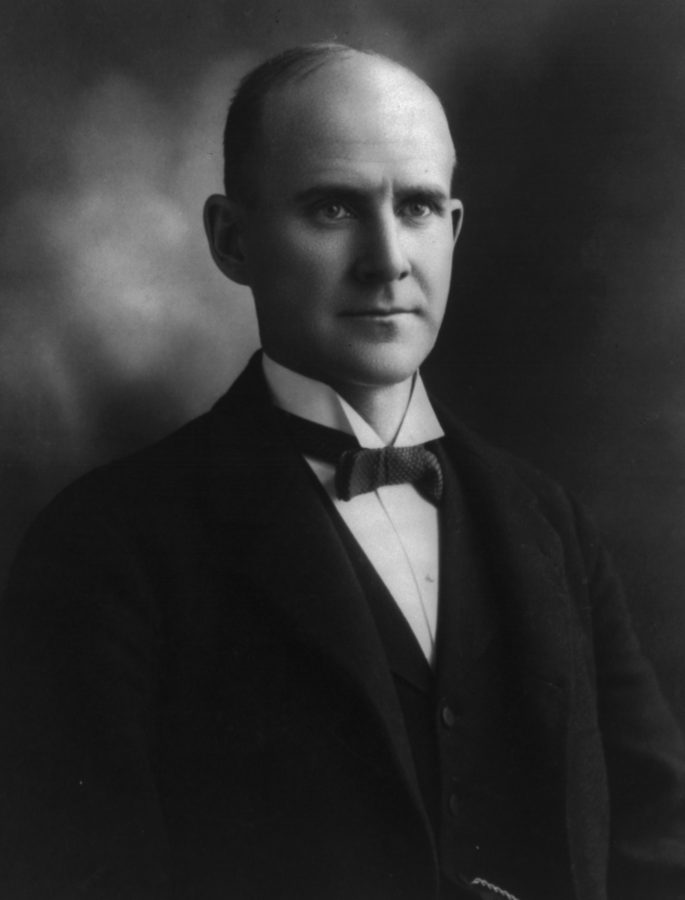Woodruff: Third-party candidates don’t receive fair treatment from media
Eugene Debs received the most amount of votes ever for president by a Democratic Socialist when he ran in 1920.
January 27, 2016
As the presidential race continues, we are still being constantly bombarded with many candidates. You can hear students advocating for or against nearly every candidate while walking through campus, yet no single candidate seems to stick out as ideal. My solution is to do what many call “throwing away my vote” and vote for a third party.
Gallup launched a poll in 2014 to see how satisfied Americans were with the current two-party system, and the results showed a dismal outlook for both parties.
The poll reported that Americans felt the Democratic and Republican parties are doing a “poor job.” Gallup revealed that as a result, a whopping 58 percent of Americans wish there was a third-party candidate they could vote for.
A 2015 poll, also by Gallup, revealed how favorably Americans viewed the two current political parties. The positive view of the two parties has dropped to 39 percent, which is far lower than its average of 50 percent.
Many Americans are opting to disassociate with the Republican and Democratic parties and identify themselves as independents. A total of 43 percent of Americans who participated in that poll now label themselves as political independents.
So with a majority of Americans asking for a third-party option, why are these candidates still being shoved to the background? Simply put, the media is destroying the third party’s chances of winning.
Third-party debates are simply not televised nationally, a prospect that caused enough outrage for the Green and Libertarian parties to file a lawsuit against the Commission on Presidential Debates in federal court. These parties claimed that the commission is intentionally limiting the debates to Republican and Democratic nominees only, a completely unjustifiable move.
Along similar lines, the Communications Act of 1934 is also limiting the coverage independent parties are receiving. The act states that TV and radio channels must give every legally qualified political candidate equal air time.
However, the act has made a few exceptions that make it nearly impossible for third parties to receive the equal treatment they were supposedly allotted. The Chicago Monitor cites that the Communications Act of 1934 states that an “on the spot” news event does not require equal coverage for all candidates.
Unfortunately, political debates are considered on-the-spot news events, thus third parties are deliberately eliminated from nationally televised political debates.
The Commission on Presidential Debates has also set outrageous standards that third parties must meet in order to receive TV air time. Any independent candidate must have 15 percent in the polls two weeks before the presidential debates in order to qualify to participate, according to US News.
To date, no candidate has ever met these absurd standards, and understandably so. The Huffington Post reported that several Republican and Democratic candidates would not qualify to participate in debates. As of Jan. 21, Martin O’Malley, Marco Rubio, Ben Carson and eight other candidates would be ineligible to participate in debates if they were held to the same standards as third-party candidates.
Taking a look at the current Democratic candidates, my attention is drawn to Bernie Sanders. Sanders served 16 years in the House of Representatives as an independent, yet he is on the Democratic ballot for the presidential race.
CBS News quoted Sanders on this topic. “If we were serious about winning this election, which is always my intention from day one, I thought we could and I hope that we will. I had to do it within the Democratic primary caucus process,” Sanders said.
This alludes to the fact that Sanders knew he wouldn’t even register as a blip on the political radar if he ran as a third-party candidate, and if he wanted any chance of winning he had to register under one of the main political parties.
With Americans loosing faith in the current dual party system and asking for more third-party coverage, it’s time the media caters to the people’s needs. Citizens are asking for more coverage on third parties, yet the media continues to deny this right to its people.
We have reached a point in time when voting third party should no longer be seen as a wasted and thrown away vote. It should instead be deemed a viable and valid option.
















